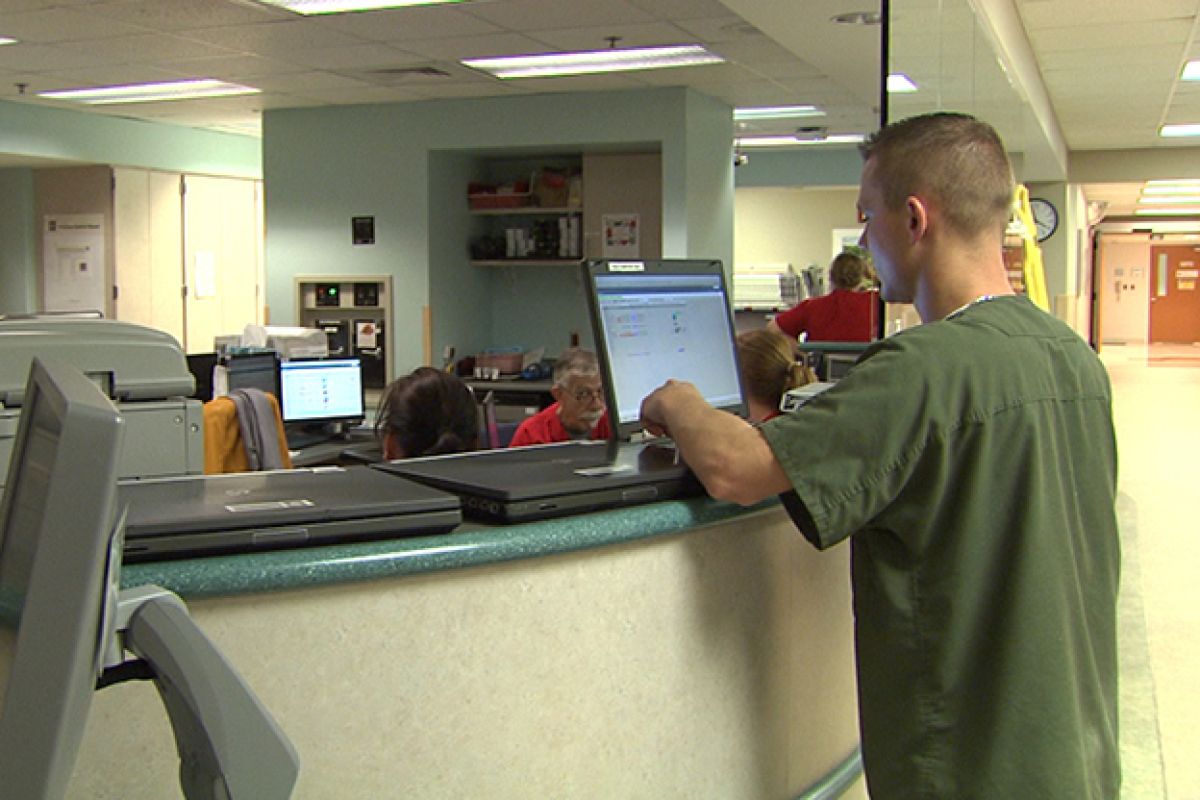
Procedural errors are confusing people and leaving some stunned with unexpected loss of Medicaid health insurance coverage. (WFIU/WTIU)
A federal agency is alarmed by the magnitude of Medicaid coverage losses in states including Indiana, Ohio and Kentucky.
In recent letters sent separately to each state, the Centers for Medicaid and Medicare Services, raised concerns about the high rates of people losing Medicaid insurance.
The letters pointed to people who were kicked off Medicaid, not because the state confirmed they are ineligible, but because of “procedural reasons” like paperwork errors, missing or returned mail and people not responding to the state’s notices among others. Nationwide, procedural reasons were behind 74% of the Medicaid coverage losses since April, according to KFF, a non-profit that focuses on health policy.
“We urge you to take further action to reduce the number of terminations for procedural reasons as quickly as possible,” stated the CMS letters on August 9, which were directed to Medicaid officials in each state.
Since a federal policy expired in April that barred states from kicking anyone off Medicaid during the pandemic, states have been sifting through their rolls and some have been dropping people off the low income public health insurance program at a breakneck speed.
“We are seeing just so many errors,” said Glo Showalter, a Medicaid navigator in Indiana who helps people get on and keep their health insurance. Showalter is trying to help more frustrated clients as the state’s procedural disenrollments averaged 86% as of August.
Other states are experiencing similar levels of procedural disenrollments during the same time: Minnesota 85%, Ohio 73%, Missouri 76%, Kentucky 75%, and Iowa 62%.
He did everything right, why did he lose his Medicaid?
These errors that cause people to unexpectedly lose their health insurance are leaving many confused and others stunned –– like 38-year-old Daniel Hodge of New Albany, Ind..
Medicaid is a lifeline for Hodge. It’s how he can afford his insulin and a new drug that has drastically improved his diabetes, on top of his mental health medications. Before Medicaid, he had to pay hundreds of dollars just for the insulin and often used to skip on the other medications altogether.
He was startled when he received a letter in February from the Indiana Family and Social Services Administration, which manages Medicaid. The letter said state records showed Hodge’s employment had ended and that he needed to update his work information to stay insured.
But that was inaccurate. Hodge has been doing the same job as a caregiver for the past four years, even before he got on Medicaid.
“It was very disheartening and frightening,” he said. “It was very concerning because at the same time I was having financial difficulties. So, if I did lose my insurance, I might not be able to pay for some of my medications.”
Hodge went to the local Medicaid office to ask about the letter. He was pleasantly surprised by how helpful and caring the caseworkers at the office were.
“They said [the letter] was a glitch, and that it was no big deal,” Hodge said.
But about four months later, in mid-June, he received another letter. It said that because he hadn’t responded to their multiple requests for information, he will be kicked off Medicaid. The letter was dated June 1 but it arrived mid-June, leaving Hodge with a slim, closing window to act to save his health insurance.
He went to the Medicaid office –– again. Caseworkers told him state records showed that multiple attempts to reach him were made but the letters returned.
A caseworker at the office helped him scan his paperwork at the office and assured him that his insurance will remain intact.
But a few days later, Hodge’s pharmacy contacted him saying that his insurance is not working. His Medicaid was temporarily suspended because by the time the state was able to verify and update his case, it was past the date his coverage was set to end.
It took several phone calls, waiting for more than two weeks and a few skipped doses of medicine for the FSSA to reinstate Hodge’s coverage.
When asked about Hodge's case, the FSSA said, in an emailed statement, that it is “committed to helping eligible Hoosiers retain or regain their Medicaid coverage.”
“We have been engaged in ongoing communication with stakeholders, including navigators, to hear feedback about what they and Medicaid members are experiencing to best inform our efforts," said Michele Holtkamp, the FSSA strategic communications and public affairs director. "We can not speculate about individual cases.”
How bad is bad?
Stories like Hodge’s do not surprise Tracey Hutchings-Goetz, communications and policy director at Hoosier Action, an advocacy group in Indiana.
In fact, she said that, as concerning as what’s happening now with Medicaid in Indiana, it’s also completely expected.
“We worked with Medicaid members before the pandemic, and I would hear these kinds of stories all the time,” she said. “It was just not getting picked up.”
Since the federal Public Health Emergency expired, Indiana, and other states, have had to submit monthly reports to CMS detailing their Medicaid redetermination numbers. This also includes the number of people who are disenrolled based on proven ineligibility versus those who were disenrolled for procedural reasons. States did not make such detailed information public before the pandemic.
“For the first time, we're actually sort of seeing the nuts and bolts of how this all works,” said Adrianna McIntyre, assistant professor of Health Policy and Politics at the Harvard T.H. Chan School of Public Health.
McIntyre said it is hard to know how the current numbers compare to what states had routinely been doing before the pandemic. But it’s likely that the numbers of procedural disenrollments now are worse because of added challenges that state Medicaid agencies have to deal with.
“There's the fact that we paused renewals for three years, which means that this is the highest volume of redeterminations that states have ever done,” she said.
During the pandemic, Medicaid enrollment ballooned and reached more than 92 million people across the country by December 2022 –– a 30% increase from the same time before the pandemic.
“And in those three years, there was a lot of turnover in state Medicaid agencies and navigator organizations,” McIntyre said. “And so, for a lot of people in a lot of states, these might be the first renewals that they're processing for real.”
But the procedural disenrollment numbers might not tell the full story, said McIntyre.
For example, people who know they are ineligible for Medicaid –– due to a bump in their pay, or securing other employer-sponsored insurance among other reasons –– will likely not go through the hassle of responding to the state's notice. Still, this would be added to the bucket of procedural disenrollment to no fault of the state’s.
“There are some people who are just not going to complete paperwork. If there's a 5% buffer where people just don't complete their paperwork, that's not great. But it feels like 86%, though, is too high,” McIntyre said of the procedural disenrollment rate in Indiana.
Right now, there is no consistent data to tell what’s underlying these procedural termination rates or what can be done to fix them. McIntyre said it would be helpful if states can break down this data by specifying, for example, how many of these procedural disenrollments were due to returned mail or someone not responding or filling out the paperwork incorrectly.
Indiana started doing a form of that. In its June report to CMS, Indiana reported that 30,751 of disenrollments happened for a procedural reason, and that 10,440 of those cases “also had a nonprocedural reason for closure.” In July, the state reported 29,767 people were disenrolled for procedural disenrollments with 9,352 of them “known to have another reason for disenrollment, such as they were over income, had died, or had moved out of the state. They did not respond/provide additional information to counter the information the state had available that showed they were no longer eligible,” Holtkamp of the FSSA said.
Still, this means that some of the nearly 40,000 people who lost Medicaid in June and July alone might still be eligible.
A big concern is that people are not getting the notices. Medicaid enrollees, especially Black Americans, are at high risk for housing instability. They may have changed addresses, phone numbers and emails during the pandemic. So, state notices might not be reaching them.
“We use the National Change of Address Database and USPS to find other possible addresses for members as part of our intense efforts to reach Medicaid members,” said Holtkamp.
What does the big picture look like?
Nationwide, millions of people are slipping through the cracks of a complicated Medicaid red tape.
Nearly 74% of the 5.4 million people who lost Medicaid across the U.S. lost it due to procedural reasons, according to KFF.
There’s a big variation between states. Michigan for example has reported a 17% procedural disenrollment rate while New Mexico reported a whooping 97%.
Meanwhile, the Medicaid agency in Florida is facing a class action lawsuit brought by two consumer advocacy groups –– the National Health Law Program and the Florida Health Justice Project. The suit claims that tens of thousands of Medicaid beneficiaries were disenrolled without adequate explanation. However, that suit focuses only on people who were determined ineligible by the state and does not address the hundreds of thousands who’ve lost coverage for procedural reasons.
“The Florida Agency for Health Care Administration and Department of Children and Families have known since 2018 that their notices are confusing, difficult to read, and fail to adequately explain the reasons someone is losing Medicaid,” said Sarah Grusin, senior attorney at the National Health Law Program.
The suit highlights issues that mirror the experiences of Medicaid clients and navigators in other states too. Patient advocates say, even before the pandemic and the unwinding, the system has been complicated and hasn’t taken the needs of the most vulnerable people into account.
“The system is set up based on middle class assumptions of people having stable housing, and not having to change their address frequently,” said Glo Showalter, the Medicaid insurance navigator in Northern Indiana. “The folks most vulnerable are really bearing a burden of the inefficiencies of this system, of the lack of prioritization from lawmakers. And I just want the people making the decisions to have to live a day in the lives of the people that I'm working with, like, try it out. How does it feel?”
Brittani Howell, WFYI and Side Effects Public Media’s community engagement specialist, informed this reporting through listening sessions and community outreach.
You can reach Farah Yousry at fyousry@wfyi.org.
Side Effects Public Media is a health reporting collaboration based at WFYI in Indianapolis. We partner with NPR stations across the Midwest and surrounding areas — including KBIA in Missouri, Iowa Public Radio, Ideastream in Ohio and WFPL in Kentucky.
9(MDIwNjQ2MTYzMDE0NDM1NTQ0OThlYjEzMg001))











